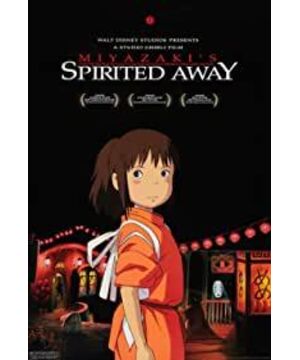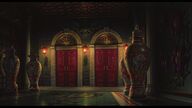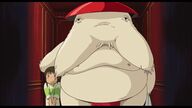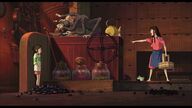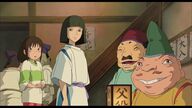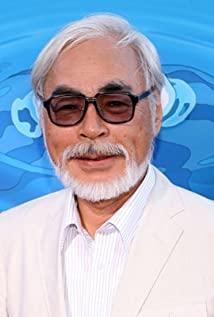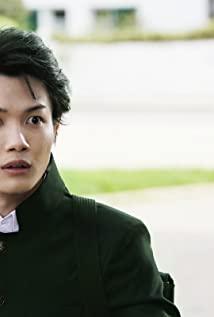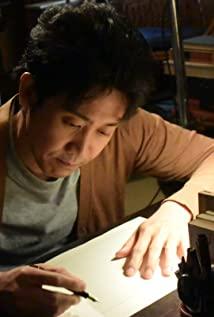Good movies are often multi-layered and multi-dimensional. Maybe they are superficial stories and inner stories, maybe bright stories and dark stories, maybe original stories and metaphors, so that they can be interpreted from multiple angles. Regarding "Spirited Away: The Hidden Spirit", this story tells a fantasy story of a girl who strayed into the hidden world. As for its metaphorical story, I think it can be interpreted in at least three levels:
- Growth theme, comparison between children and adults.
- Society, humanity, and psychology.
- Japan’s bubble bursts and the economy is in recession.
The first meaning is the most common consensus. This is Hayao Miyazaki's consistent gentleness towards children. Although he is pessimistic and disappointed with human beings, he insists on praising the beauty of innocence in subtle ways, and bringing them courage with blessings.
For example, adults think they are familiar with the rules of society, become self-righteous, use excuses to indulge their desires and lose their vigilance, to set off the innocence of children. They can naturally feel that danger is approaching, and they know better than adults. The wrong thing-don't eat anything in the store without consulting the boss, even if you have money and a credit card.
In Miyazaki's eyes, there is tremendous energy and virtue in children's bodies, and they have not yet contaminated the defects of adults. So we found that Chihiro, who appeared to be timid and helpless on the surface, had to rely on her own efforts to walk the way after she was introduced to the door and told the rules by Bailong. Her potential was stimulated in the crisis. , Worked tirelessly, was not afraid of danger, had the courage to assume, and apologized on behalf of others, so she helped the river god, the shop assistant who was swallowed, the faceless person, the fat baby, and finally saved Bailong and saved herself. Also saved the parents.
Based on the first level of feeling, there are many soulful chicken soup-style beautiful essays, such as "Life is a train that goes and never returns. Someone grows up with you on the journey, but no one can accompany you to the end." The Chinese version poster adopts the two most important points conveyed in the film. The two important tips from Bailong to guide Chihiro out of the hidden world are "Hide your name, otherwise you will not find the way home." And "Go back the same way, don't look back", the extension is actually "Don't lose yourself (don't lose yourself, lose your nature)" and "Go forward and don't look back (Don't be afraid, go on bravely)", it is a movie The advice and encouragement expressed.
Many people have written about the first level of expression above, so let's just talk about it for the time being.
The second meaning is the expression of human nature based on Japanese society, but it also has a certain versatility in the world.
In the film, when it gets dark, Chihiro leaves her parents and comes near the soup house. His body begins to become transparent. Bailong says that if he doesn't eat anything here, he will disappear. I think this metaphor is that people leave their homes to enter society when they are adults, and they must abide by the rules of business society, otherwise they will become "transparent people" and disappear from the mainstream vision.
The solidification of Japanese society is extremely serious. If you fail to work in the company at the beginning, you will be excluded from the mainstream and become a marginalized person. It’s like a faceless man who always stands on a bridge and never enters a soup house. He is often invisible. The old Japanese man who was killed by his father a while ago is also such a marginalized person. He is still very common in Japan. A social phenomenon.
After entering a company, the Japanese basically have to leave all the time, and there are not many opportunities to change jobs. As stated in the film, one cannot leave after signing the contract of the soup house. This paper labor contract is like a contract of life, which buys people's freedom.
Granny Tang and Granny Qian are twins, they are one body with two sides. Granny Qian represents money and Granny Tang represents capital. At first we thought Mother Qian was a bad person, as if saying "money is the root of all evil". Later we discovered that Mother Qian was not a bad witch, but lived a simple life in a remote hut, doing simple things. And then kindly tell the children that only the items made by hand are the best to use. Because money is a tool to replace the circulation of labor value, the real "evil" is the twin "capital" of "money".
Granny Tang lives in a luxurious house and squeezes everyone under her. It is not enough to sign the contract. She has to take their names, deprive them of personal freedom, and sacrifice their lives. She is also good at formulating rules and exploiting loopholes to play tricks. The executives in the soup house pay great attention to cost control, stingy in using high-priced medicated baths, and just want to fill them manually. These are all fables about the bloodthirsty of capital, the exploitation of surplus value, and the kidnapping of the law.
In order to pursue higher profits, capital will move mountains and reclaim the sea at all costs, do large-scale construction projects, pollute water sources, and destroy the environment. The man-made river at the entrance of Shenyin World is the best irony. While people are filling up natural rivers (white dragons) or polluting ("rotted" river gods), they are building so-called artificial paradise, digging rivers to make them fake natural. . When Chihiro left, he found that the water of the man-made river was missing, which shows that the creator has a special meaning for the setting of this river.
In a capital society, people do their best to pursue money, so there is a large plot of the whole house flattering faceless people. Money is an extension of desire. It seems that everything can be bought or fulfilled, just like Ling dreams of leaving the soup house. Go far away.
There are a lot of pictures about "eating" in the film, which is the most direct metaphor for desire. Faceless people use counterfeit money to defraud them of luxury meals that are not their own. They are greedy and demandless, and they have developed to the point of "cannibalism". Grandpa Boiler uses high-quality ingredients to burn the gecko and asks Ling to help Chihiro. Ling uses it to draw the frog's attention and help Chihiro get to the top floor. Ling sent a bento to Grandpa Boiler, but the coal spirits could only eat some small stars that looked like cat food. Everyone is working, but in order to exchange food, but the status is different, the harvest is different. Coal spirit is a symbol of the bottom of society, the cheapest labor, a large quantity but few requirements.
Chihiro's parents didn't work, so they didn't take their own food, so they became pigs that were raised, waiting to be slaughtered to eat meat. You want to get something for nothing, so stocks, pyramid schemes, p2p, and finally become cut leek. Only Granny Tang’s giant baby can get something for nothing. Therefore, Grandpa Boiler warned that if you want to be lazy, you will be turned back to cinder if you don't work. Yes, although the work is hard, but without a job, what can I do to feed myself, I can only lose my life. Jobs are limited. Qianxun who suddenly broke in is tantamount to grabbing the job of the coal spirit. When the coal spirit realized this, he protested for a while and wanted to push Qianxun away and drive her away.
Granny Tang doesn’t want to work for Qianxun, but also wants her to become a pig, because pigs have the greatest squeezing value. They have lost all their freedom and become meat on the cutting board. They can only be slaughtered by others. Eat clean. But the rule of the soup house is that you can use labor in exchange for a job, so Granny Tang has no choice but to face Chihiro who insists on working.
Faceless people are very popular, probably because the character is designed to be too appropriate. His entire image, facial expressions, and the subtle grasp of the human heart are just right, so that too many emotions can fit perfectly, and what he conveys is hidden in the heart. The various negative energies of each of us have channels that can be echoed with them. After all, there are yin and yang in the world and everything, and no one can live with completely positive energy. This is in line with the widespread mourning that is now on the stage. The culture coincides with each other.
To be able to design such an image, on the one hand, Ghibli’s skill is really amazing, on the other hand, I think it’s also because Japan has been so lost in the past few decades. This kind of mourning is in all aspects and permeates all corners of society. In addition, Japanese culture is second to none even in the entire Eastern atmosphere that is biased towards suppressing humanity. The deeper they feel about it, the more accurate they will be.
For the second level of expression above, let's stop here. The general meaning is this, and the rest can be deduced by analogy.
The third meaning is that every Japanese is heartbroken and unforgettable. Regarding the history of the great ups and downs experienced by Japan, from economic prosperity to bubble blowing to bursting, total recession, the lost 20 years have not yet been able to get out. . In the film, after the Chihiro family enters the hidden world, Chihiro's father mentioned related lines, which is the title of the movie on the adult level.
The capital society is as small as a company, as large as a country, and then as large as the entire world. If you regard the soup house's contract as the "World Trade Agreement", "Plaza Agreement", etc., why not Japan was kidnapped by the United States, it will never be free, and it will be difficult to get out.
The most frightening thing was that Japan at the time seemed to lack financial knowledge. He didn’t realize it and didn’t know it. All he knew was that he was excited about overhauling and building, squandered, trying to "buy the world", but almost lost the guy who settled down. Put the lifeblood of the economy into the hands of others. Of course, the power gap lies there, and it is inevitable to be kidnapped and controlled, but Japan's unconsciousness has exacerbated the severity of the consequences, just like the Chihiro parents in the film, who are less greedy than a child.
At this level, coal refined is like some third world countries, providing a lot of manpower in the industrial chain in exchange for foreign exchange, and then obtaining some of the resources that need to be exchanged for foreign exchange. But Japan was in the process of swelling, forgetting the importance of labor, and unknowingly became a pig that was raised with fat and big ears, and eventually became meat that was slaughtered when the bubble burst. In this way, Granny Tang's transformation into a bird can be understood as an eagle, and the giant baby becomes a giant eagle baby, sitting and enjoying the global surplus value, although he can actually stand, walk, and work himself.
Chihiro insisted on working, so Granny Tang had to agree, because she once made such an oath, which represents the business rules of the capital society, everyone can abide by and use it, because the profit-seeking nature of capital has no borders, as long as If you can provide valuable, especially cost-effective products/labor, capital will choose you, and you will get a position of your own.
The faceless people deceived the fruits of labor created by the people in the soup house with the fake gold from the mud. Gold is hard currency, the U.S. dollar is paper gold, and the overprinted U.S. dollar is essentially just dirt, but it has replaced products and services from other countries. , The consequences have to be borne by others, and such "killing pigs" is tantamount to "cannibalizing".
The word "oil" shown in many places in the film, I don’t understand Japanese and I can only check it on the Internet. I saw someone explain that "oil" is similar to "tang" in pronunciation, and both have the meaning of water, so oil house is soup house. It's a place to take a bath. But why does the place managed by Mrs. Tang insist on using oil characters instead of soup characters, and show emphasis in many places? Or why don't you let Mother Tang call her mother-in-law oil altogether?
For one thing, oil is used as an adjective, which means that things are not serious (from Baidu knows). I think this refers to the impetuous state of Japanese society at that time.
Secondly, in ancient Japan, oil was used to remove impure things, and in Japanese Shinto, there is an idea that if a god touches impurity, he will lose his power. In that era, bathhouses were used by the gods to remove Unclean place (from Baidu knows). This is very much in line with the setting of the ghosts and ghosts in the hidden world and come to bath in the soup house.
Thirdly, and most importantly, it is my personal brain. The word oil that has been emphasized everywhere may imply the operation of kidnapping oil pricing power with US dollars. This is the root cause of the United States being able to suck blood from the world and Japan’s economic recession. At the root of the injury, Ghibli placed its accusations in various conspicuous positions in the film.
At this level, because adults, or those in power in Japan, further speaking, the whole society has made concerted efforts to send the country to an irreversible situation and sacrifice the young people in the future. This is the right of "Chihiro parents". "Chihiro" is owed, but they themselves have paid a painful price. There is a suicide forest in Japan, and a wave of charcoal burning in Hong Kong. The bursting of the housing price bubble is no less powerful than a nuclear bomb, ruining the happiness of many people in their lives.
Speaking of the word "oil", I would like to mention the "Fu Le" on the plaque on the entrance of Shenyin and the "Hou Le" on the plaque in the soup house.
There are two related sources for "Fu Le". One is Milton's long poem "Fu Paradise", which tells the story of Jesus resisting Satan's temptation and saving mankind back to the Garden of Eden. The second is Thoreau's collection of essays "Return Paradise", which shows the severe consequences of modern society's excessive demand for resources from nature, and his advice and suggestions to human society have influenced many celebrities.
The former is exactly the story of "Spirited Away"—saving humans back home from the world of ghosts and ghosts, and the latter is a metaphor for the story of "Spirited Away"—that human beings wreak havoc on the environment for desire under the great economic development.
As for "Hou Le", it comes from Korakuen Garden, one of the three famous gardens in Japan. The word "Hou Le" is taken from "First worry and then happy", which is Fan Zhongyan's "After the world is happy and happy", here It should be Hayao Miyazaki admonishing the public not to indulge in enjoyment, but to have a sense of worry and know how to delay satisfaction.
From the perspective of the film, Hayao Miyazaki’s attitude towards this is heartbroken and sympathetic. He hopes that people can find themselves, not to lose their nature, to regard labor as the most important thing, and not to be kidnapped or nurtured by capital. His hope is projected on young people, hoping that they will not forget their original aspirations, work hard, return to simplicity, and go forward bravely.
From this point of view, it is quite interesting that Chihiro was introduced to the air at this time. In front of the theater this month, there is "Loss Munich", saying that there is no permanent boss, as long as there is confidence, there is a chance of victory. It is necessary to unite and work hard, adapt to local conditions, learn from the barbarians, and move forward courageously. Later, "Spirited Away", don't forget your heart, bid farewell to impetuousness, work hard, and return to simplicity.
There is still a long, long way in the future, waiting for our own hands to create it.
View more about Spirited Away reviews


